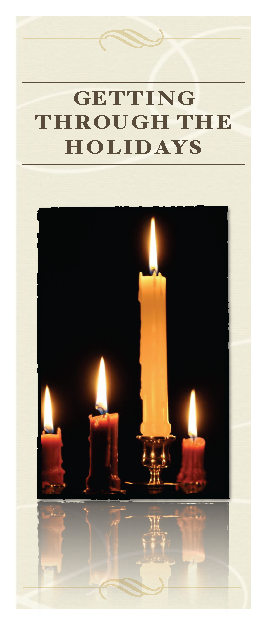When Someone in Your Group Is Grieving
| By admin
When someone in your small group is struggling with grief, your God-given nature wants to help, to “mourn with those who mourn,” as the apostle Paul instructs in Romans 12:15.
But often we are not quite sure what to say or do.
Grieving can be especially difficult around the holidays due to the many memories and emotions attached to festivities and traditions. We know that God asks us to love and care for one another, so knowing how to lead your group with sensitivity and understanding will help everyone.
The holidays can create special challenges for those in grief. Those with a recent loss may be feeling sad, withdrawn and angry while others are excitedly baking cookies, decorating their houses and hanging lights. Finding joy or even thinking about putting ornaments on a tree can feel overwhelming. Plus, the grieving person may be concerned about how their sorrow will affect others around them and may tend to withdraw.
As the holidays approach, offer the brochure Getting Through the Holidays. (Consider sharing this brochure with your church. Some churches make copies for members to use and share with others.) The suggestions and ideas give permission to those experiencing grief to decide what holiday activities they will choose not to do so it’s easier to decide what they can handle emotionally. There are also good ideas for managing the stress of Christmas expectations, plusways to honor a loved one.
If your group is going to be getting together during the holidays, check in separately with the grieving person and see if he or she is ready to get together with the group or if more space and time is needed. If the person is ready, you can gently ask what activities sound the most appealing. For example, you could offer a gathering where the rest of the group brings food to share, and include a time to pray.
See if the person would appreciate meals from friends. If so, someone in your group may be happy to organize meal signups through an app like mealtrain.com or takethemameal.com.
But think beyond meals as well. The friends and family of one grieving person set up a “phone train.” They signed up for times to call her, leading up to Christmas and afterwards, so she often had someone checking in on her. Groups can take turns calling or visiting so the grieving person is reminded that he or she is not alone.
In those calls or visits, here are some practical tips for you and your group:
1. Don’t speak much, just listen
Silence dignifies a person’s hurt because sometimes the pain is too deep for words. This ministry of presence, of being “with” someone, involves listening a lot, speaking a little, and bringing the presence of Christ in you alongside the person who is in pain. Studies have concluded that the two most helpful listening behaviors when interacting with the bereaved include providing the opportunity for them to vent, and just being there.
2. Use gentle, sensitive words
When you do speak, let it be from your heart, not from your head—don’t try to offer nuggets of wisdom. One of the best things you can say to someone who is struggling is simply, “I’m sorry.” Ask good questions; don’t offer trite answers.
Hurting people need you to acknowledge that their pain is real. Allowing people to speak of their sorrow gives them permission to grieve and helps them move forward with healing.
When you do feel it is right to speak, remember these things:
- Use phrases like, “I can’t imagine how difficult this is,” or “This must be awful.”
- Do not offer platitudes. (For example, don’t say, “You have so much to be thankful for,” or “It’s a blessing that she’s out of her misery,” or “Everything happens for a reason.”)
- Don’t minimize the grief. Refrain from saying “at least.” (For example, don’t say, “At least he didn’t suffer,” or “At least you had many good years together.”)
- Do not give unsolicited advice. (For example, don’t say, “Now that your husband is gone, you should consider getting a dog,” or “In ten years you will not even remember this,” or “Don’t you think it’s time to move on?”)
- Do not claim to know how the person feels. (For example, don’t say, “I know just how you feel, I experienced . . .”)
3. Avoid Theological Pronouncements
Be very careful about what you say spiritually, about offering pat Christian answers (like, “God needed him more than you,” or “He’s in a better place now”). Don’t speak for God.
4. Show Up!
Show your love by sitting quietly in support, offering a prayer, stopping by the house, providing a meal, or expressing your concern—and always listening.
By listening, you can give the grieving person space to talk or even to be light-hearted. As you listen, you may discover that decorating, cleaning, or getting groceries feels daunting, and you can offer to help with decorations or a cleaning project, or to go to the store together. A bonus: simple activities together can take the focus off conversation, and the person experiences your presence while accomplishing helpful tasks.
Consider sharing this article with others in your group so they can grow in understanding how to support those who are grieving.
By showing up in physical and practical ways, we incarnate Christ’s love to hurting people. That speaks much louder than words.
–-
Editor’s Note: Many of the suggestions in this article are taken from The Art of Loving 5.4: How Can We Love People Who Are Hurting?
Recent Posts

Resurrection: What Is the Best Evidence?
What would cause someone to believe Jesus bodily rose from the dead? And what difference does it make? At first “Dan” told our Q Place group that...
Read More >
The (Surprising) Benefits of the Inductive Approach
When Pastor “Ted” and his wife, “Angie,” came to Q Place Coaching, they were eager to learn how to start small groups for people who...
Read More >
How to Find a Great Bible Study Guide
The Bible is the best-seller of all time, bar none. And groups that study the Bible together can be extremely interactive, thought-provoking, and...
Read More >
How to Find a Bible Discussion Guide to Fit Your Group
Looking for any of Q Place's Bible Discussion Guides? Find the whole list here, with links to our web store where you can order them.
Read More >
When Your Group Has Senior Citizens
At first our group didn’t know about Sarah’s hearing loss, but it didn’t take long for us to notice her phone buzzing and delivering feedback...
Read More >
The Art of Loving People in Your Path
Every year on Valentine’s Day, Brenda follows her typical path of running errands, but the day takes on a new dimension as she gives small...
Read More >